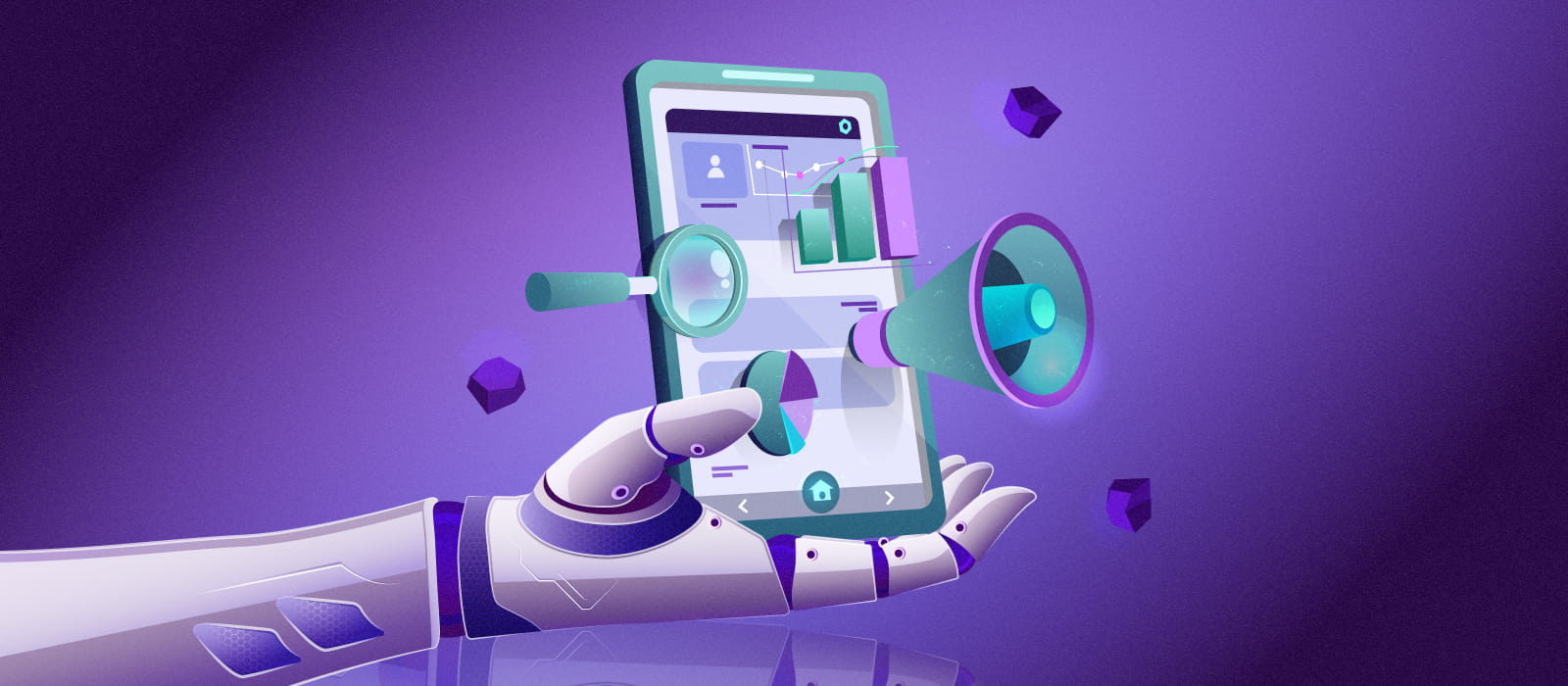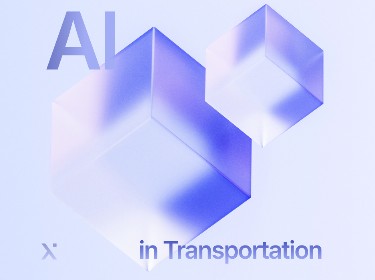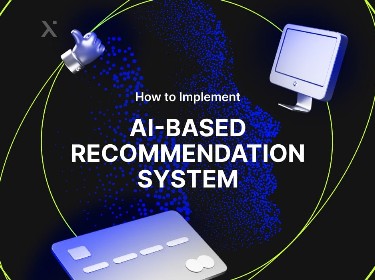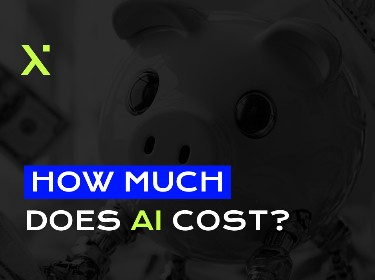As technological advancements reshape industries, the field of marketing is undergoing a significant paradigm shift. With the development of generative AI tools like ChatGPT, marketing teams now have a wide range of opportunities at their fingertips.
It is projected that AI could add a massive $15.7 trillion to the global economy by 2030.
By including AI in their marketing plans, businesses can gather insights that can help improve sales, boost revenue, and make the job easier yet more productive for marketing staff. Therefore, it’s essential to adopt a culture that’s both AI-friendly and data-driven.
Read on to learn about how your business can use AI in marketing and see real examples of how this technology can enhance marketing results.
What is artificial intelligence in marketing?
Artificial intelligence in marketing refers to the use of ML models and algorithms to quickly analyze marketing data and draw swift conclusions based on campaign details and customer behavior. The use of artificial intelligence enables marketing teams to focus on higher-level strategies, which can subsequently guide AI-driven campaigns.
Marketing assets powered by AI come in various forms, including but not limited to personalized content, predictive analytics, customer segmentation, dynamic pricing, and recommendation engines.
Our ML team can help you implement ML-based solution that will analyze customer data and provide actionable insights in real time
How is artificial intelligence used in marketing?
From content generation and data analysis to smart automation and sales forecasting, AI provides numerous opportunities that help businesses enhance their marketing activities, improve customer experience, and boost sales.
Let’s take a look at each specific use case of how you can leverage AI in your marketing campaigns.
![]()
Improve customer segmentation
Customer segmentation allows for creating more targeted and personalized customer campaigns. The introduction of AI in this process helps achieve better precision and efficiency.
Through this deep data analysis, AI can discern subtle patterns, behaviors, or preferences that might often be overlooked using traditional methods.
Besides, leveraging AI in marketing, you can implement real-time segmentation. Instead of relying on sporadic data analysis sessions to define customer segments, AI systems can constantly adjust and refine these classifications as new data flows in. This ensures that your marketing efforts are always aligned with the most current customer insights.
Furthermore, continuous analysis and segmentation by AI systems empower marketers to customize messages, promotions, and content to specific customer segments, or even to individual users. This level of personalization will help you ensure higher engagement rates and better customer retention.
Enable predictive analytics
Artificial intelligence processes large datasets swiftly, identifying and extrapolating patterns from past consumer behaviors and interactions. This allows you to make data-backed predictions on future outcomes efficiently.
For example, eCommerce companies can implement AI in their marketing campaigns to predict sales trends based on historical data. By analyzing data received from multiple sources, such as social media and news outlets, AI systems detect shifts in market trends or consumer sentiment. Having this information, your marketing team can adjust their strategy proactively and optimize marketing campaigns in line with consumer expectations.
Furthermore, AI can anticipate which campaigns will resonate with specific demographics or how different customers might engage with particular promotional content. This empowers you to tailor your marketing efforts for maximum ROI.
Automate and personalize content generation
AI’s capacity to aid in content creation, optimization, and personalization is empowering marketers to reach audiences more effectively and authentically.
One of the most transformative artificial intelligence advancements in content generation is generative AI. Generative models, such as GPT variants, have been trained on vast datasets, allowing them to generate coherent and relevant content. This helps marketers automate their content generation processes and focus more on strategic goals. This is particularly beneficial for businesses aiming to scale their content output without compromising quality.
Besides, AI models can analyze user engagement metrics and tailor content in real-time, thus helping you adjust content to the needs of your audience.
Our team conducted research on how generative AI models can be used across various industries. Check it out
Implement AI-driven automation
By integrating AI in marketing, you can automate time-consuming tasks, such as data collection, campaign scheduling, ads creation, and email marketing, thus freeing up teams to focus on more strategic and creative tasks.
For example, AI algorithms can provide real-time suggestions on ad placement, considering potential viewers and optimal posting time. This helps ensure that specific ads reach the right audience at the opportune moment, driving higher engagement and conversion rates.
You can also consider developing chatbots that will serve as the front-liners in customer service and engagement. These bots can answer queries, provide product recommendations, and even process orders, reducing the need for extensive customer service teams while offering consistent and immediate responses 24/7.
Get customer insights regularly
AI and ML algorithms allow you to receive real-time data on customer engagement and loyalty. AI can process massive amounts of data, such as customer interactions, purchases, and clicks at unparalleled speeds. By continuously monitoring this data, AI-powered solutions can offer up-to-date insights into customer preferences and pain points.
Sentiment analysis stands out as one of the most exciting AI applications for analyzing customer engagement. By scanning user reviews, comments on social media platforms, or feedback forms, AI can gauge the sentiment — be it positive, negative, or neutral — associated with a brand or product. This allows businesses to address concerns promptly and capitalize on positive feedback.
Take a look at our infographics featuring useful tips on ML-powered app development
Improve customer experience
Due to the ability to efficiently analyze consumer behavior and personalize customer interactions, artificial intelligence in marketing enables brands to create a more engaging and meaningful experience for each customer.
AI can rearrange or suggest content dynamically, making it easier for customers to find what they’re looking for. This reduces bounce rates and contributes to a smoother, more intuitive customer journey.
Enhance brand recognition and reputation
AI in marketing can be also used to elevate recognition and reputation of your brand. Being able to receive timely data on consumer behavior, you can adjust your marketing strategies accordingly.
You can use AI to instantly monitor negative sentiments, select the most suitable influencers, and proactively change or adjust your marketing campaigns.
Incorporate targeted email marketing
Artificial intelligence solutions allow businesses to create automated yet engaging email marketing campaigns while also gaining insights from their email lists.
Moreover, AI-driven analytics can continuously assess the performance of email campaigns. Elements like subject lines, call-to-action buttons, and email layouts can be A/B tested with AI quickly identifying the most effective versions.
Improve media buying
You can use AI to get valuable recommendations on ads and media spent. For example, AI continuously analyzes the performance of ad placements and adjusts spending in real-time. If one ad isn’t performing as expected, AI can divert funds to more successful campaigns, ensuring that marketing budgets are spent efficiently.
Besides, by leveraging AI, it is possible to detect unusual patterns and combat fraudulent activities, such as click farms and bot traffic. As a result, you can be sure that your media buying budgets are spent on genuine and high-quality ad views.
Implement automated image recognition
Automated image recognition systems powered by neural networks and deep learning models can swiftly identify and classify visual content within photographs, videos, or live streams. For marketers, this means being able to monitor brand presence and logo placements across various media platforms.
AI-driven image recognition can further elevate the customer experience. For instance, when consumers upload images to search for a product, the technology can identify items within the picture and direct users to similar products or styles, simplifying the shopping process.
Moreover, in social media campaigns, brands can automatically categorize and analyze images shared by users to measure campaign reach, sentiment, and effectiveness, thus optimizing future marketing efforts.
AI in marketing: pros and cons
If you’re planning to integrate AI into your marketing toolkit, understanding its pros and cons becomes vital. Let’s discuss each in detail.
![]()
Pros of using AI in marketing
The implementation of AI in your marketing initiatives brings in a plethora of benefits, including increased ROI, better user engagement, future-ready planning, informed decision-making, improved scalability, and cost-efficiency.
Increased ROI
AI-powered solutions empower you to adjust and improve your marketing campaigns in real-time, which ensures reduced budget costs and increased ROI.
Better user engagement
By tailoring marketing campaigns to your audience, you can increase customer engagement rates and improve customer relationships.
Informed decision-making
Having the right data and consumer insights at your fingertips allows you to make smarter decisions that align with your marketing goals.
Future-ready planning
AI-powered marketing allows businesses to anticipate market changes and ensure that marketing strategies are aligned with future demand, thus maximizing the chances of capturing new market opportunities.
Improved scalability
AI solutions can handle vast amounts of data and customer interactions without the need for proportional increases in resources, allowing businesses to scale their marketing efforts more efficiently.
Cost-efficiency
By automating repetitive tasks and optimizing ad spend through predictive analytics, businesses can reduce wastage and ensure that their funds are utilized in the most efficient manner.
Cons of using AI in marketing
Despite numerous benefits of artificial intelligence tools, you should understand that the technology is still developing and has certain limitations.
Training time
AI marketing tools aren’t inherently programmed to achieve the desired marketing objectives. Training these models requires time as they need to process historical trends and customer behaviors to guarantee data accuracy and quality.
Privacy concerns
Both consumers and regulatory authorities are intensifying scrutiny on organizational data usage and AI privacy concerns. When deploying AI in marketing strategies, you must handle consumer data ethically and adhere to regulations like GDPR to avoid fines and harm to your brand reputation.
Learning curve
There’s a steep learning curve associated with adopting new practices. Besides, some employees may resist or struggle with the transition to AI marketing instruments. Ensuring that the team is equipped with the necessary training and support is crucial to overcome this barrier and fully harness the potential of AI-driven strategies.
Resource investment
Initial setup and integration of AI tools in your marketing system can demand substantial financial resources. While the ROI is often significant in the long run, brands must be prepared for the upfront costs associated with high-quality AI solutions.
Find out what AutoML is and how to use it efficiently
Examples of AI marketing
Let’s explore some of the most interesting examples of AI marketing in action, including Spotify, Netflix, Amazon, Whole Foods, Heinz, Coca-Cola, and Mastercard.
Spotify
Spotify uses AI models to understand consumer preferences, including purchase history, music interests, podcasts favorites, and more. Based on this information, the service generates customized playlists and recommendations. It also curates personalized song lists that introduce listeners to new tracks and artists they are likely to enjoy.
Spotify’s AI also assesses the listening habits of millions of users worldwide. This global data analysis allows the platform to identify trending genres or emerging artists, promoting them to broader audiences.
Netflix
At the heart of Netflix’s user experience lies its recommendation system, which heavily relies on AI and machine learning algorithms.
The primary way Netflix uses AI is to suggest content tailored to each user’s viewing habits. By analyzing watched shows, search queries, and even the amount of time spent on particular genres, Netflix’s AI offers recommendations that keep users engaged and increases the likelihood of prolonged subscription.
Netflix’s recommendation engine plays a pivotal role in its revenue model, accounting for roughly 80% of the content hours streamed on the service.
Beyond just recommending content, AI aids Netflix in deciding what original content to produce. By assessing global viewing patterns, genres in demand, and even specific actors or directors that are popular, Netflix can make more informed decisions about which original series or movies to fund.
Check out key trends and stats on generative AI
Amazon
Amazon’s homepage is a prime example of AI-driven personalization. Based on a user’s browsing history, purchase patterns, and even items in the cart, Amazon curates a tailored shopping experience. This personal touch boosts the likelihood of conversions, as users often find products aligned with their preferences and needs.
Amazon’s pricing strategy also relies on artificial intelligence models that help adjust product prices in real-time. The system takes into account competitors’ prices, product demand, time of day, and various other factors.
The efficiency brought by predictive purchasing and dynamic pricing allows Amazon to ensure high customer satisfaction and optimize profit margins.
Whole Foods
Whole Foods, the upscale grocery chain known for its organic products, has embraced the power of AI to enhance its communication and marketing efforts, ensuring they resonate deeply with their health-conscious customer base.
One of the most prominent applications of AI in Whole Foods’ marketing strategy is their email campaigns. By analyzing purchase history, browsing behavior on their website, and even engagement rates with previous emails, Whole Foods can segment their customer base effectively.
For those who use the Whole Foods app, AI algorithms work in the background to offer tailored product recommendations.
Furthermore, Whole Foods employs AI-driven chatbots on their website and within their app to handle routine customer queries. These chatbots are trained to understand the context and provide responses that are in line with Whole Foods’ brand and ethos.
For example, if a customer asks about organic produce, the chatbot might not only provide information on the available organic items but also share the benefits of organic farming and its alignment with Whole Foods’ mission.
Heinz
Heinz, in partnership with the marketing agency Rethink Ideas, embarked on an innovative journey to produce “the first-ever ad campaign with visuals generated entirely by artificial intelligence.”
The spark for this campaign was an observation made while experimenting with the AI image generator, DALL-E 2. When prompted with ketchup-related themes such as “ketchup in outer space” or “ketchup scuba diving,” the AI often generated visuals resembling Heinz bottles.
Capitalizing on this discovery, Rethink Ideas encouraged the public to contribute by offering their unique AI prompts centered around ketchup. The top suggestions were transformed into engaging visuals for the campaign, with these AI-generated images finding their way into Heinz’s social media posts and print advertisements.
Coca-Cola
Coca-Cola, in collaboration with OpenAI and Bain & Company, launched the innovative “Create Real Magic” platform. Utilizing GPT-4 for text generation and DALL-E for image creation, the platform set a new standard for content creation.
Fans were granted access to iconic Coca-Cola branded elements, such as the contour bottle and script logo, encouraging them to produce their unique digital art pieces.
The standout feature was the chance for their creations to be displayed on massive digital billboards in landmarks like New York’s Times Square and London’s Piccadilly Circus.
This campaign marked Coca-Cola’s entry into a pioneering alliance between Bain & Company and OpenAI, blending Bain’s strategic digital capabilities with the AI expertise of OpenAI. This initiative underscored the transformative potential of merging strategic partnerships with AI in the world of marketing.
Mastercard
Aiming to fortify its position against competitive threats in the financial services and technology sector, Mastercard Payment Gateway Services (MPGS) integrated Crayon. This is an AI-powered platform designed to provide insights into the strategies and potential threats posed by competitors.
The incorporation of Crayon into Mastercard’s competitive intelligence approach brought transformative results. As noted by Mike Wienke, the Director of Global Product Marketing and Sales Enablement, Crayon equipped the team with a comprehensive understanding of how competitors were positioning themselves in the market. This provided a unique external perspective on Mastercard, enhancing strategic planning.
Moreover, it fostered an environment of collaborative dialogue, empowering individuals from diverse departments to share and contribute invaluable insights.
Check out our success story, where we share how we built an AI-based shopping list app
What is the future of AI in marketing?
The future of AI in marketing is poised to reshape traditional strategies and offer multiple opportunities for personalization and efficiency.
As data continues to grow exponentially, AI’s ability to analyze and draw actionable insights from vast amounts of information will become indispensable. We can anticipate more sophisticated customer segmentation, predictive analytics, and real-time campaign adjustments.
Moreover, as generative AI and machine learning models evolve, the line between human-generated and AI-generated content will blur, offering marketers a vast array of tools for content creation, customer engagement, and service automation.
PixelPlex’s AI developers and consultants are at the forefront of integrating AI and ML models, ensuring your marketing campaigns resonate and deliver personalized services to your audience. Harness the power of informed decision-making with our expertise.
Reach out to us now and let’s elevate your project to the next level.




